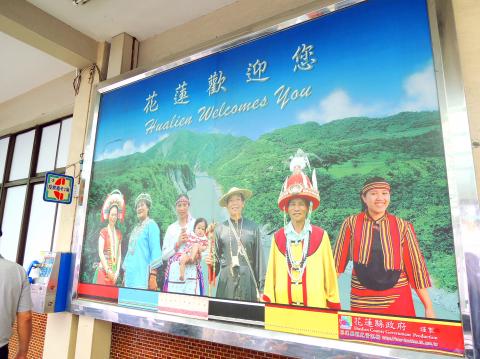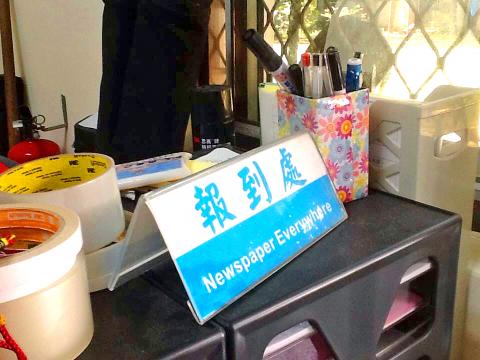In a setback to Hualien County’s much touted effort to refocus its tourist industry toward the international market, pictures of comical and confusing attempts to render signs from Chinese into English have gone viral on the Internet.
A Facebook user posted images of three road signs for Dasyue Road (大學路) within 5km of each other in Hualien County’s Shoufong Township (壽豐). The English romanization of the Chinese characters on the three signs do not match: They read “Daxue,” “Dah Shyue” and in an experimental attempt at partial translation “Big Xue,” none of which employ Tongyong Pinyin or Hanyu Pinyin, which are normally used on signs in Taiwan.
Not only would road users be confused by the multiple renditions, it seems to imply that the signs refer to three different roads, the poster wrote.

Photo: Wang Chin-yi, Taipei Times
Shoufong Township Office construction division head Huang Wen-tsung (黃文宗) said Hanyu Pinyin should be used on road signs, adding that the use of “Big Xue” was preposterous, especially as the road sign is quite new.
“We have looked into the matter and found that there were three different crews involved in the road’s maintenance,” Huang said, adding that the division would immediately set about rectifying the situation.
“We should be finished within the month,” Huang said.

Screen grab from Facebook
Other examples on Facebook of unusual English translations in the county include a hotel reception desk that informs non-Chinese speakers that there is “Newspaper Everywhere.”
The Facebook user suggested that software translated the Chinese characters, bao dao chu (報到處) (reception desk), into their literal English equivalent. Bao (報), is short for newspaper and dao chu (到處) means everywhere.
As for the billboard outside of the Hualien Train Station which read, “Hualien Welcomes You,” a teacher at National Hualien Senior Girl’s High School named Wang Ya-ling (王雅玲) said she would not expect one of her students to use the term in an English composition.
“Welcome to Hualien,” would be more appropriate, Wang said, adding that it could not be said the billboard is “incorrect,” as English speakers understand the message conveyed.
The county government’s tourism department said that the billboard had been in place for more than six years and that similar phrasing was often used by other cities around the world. However, that the county government would consider covering up the English language part of the billboard if the public find the phrasing inappropriate.

ANOTHER EMERGES: The CWA yesterday said this year’s fourth storm of the typhoon season had formed in the South China Sea, but was not expected to affect Taiwan Tropical Storm Gaemi has intensified slightly as it heads toward Taiwan, where it is expected to affect the country in the coming days, the Central Weather Administration (CWA) said yesterday. As of 8am yesterday, the 120km-radius storm was 800km southeast of Oluanpi (鵝鑾鼻), Taiwan’s southernmost tip, moving at 9kph northwest, the agency said. A sea warning for Gaemi could be issued tonight at the earliest, it said, adding that the storm is projected to be closest to Taiwan on Wednesday or Thursday. Gaemi’s potential effect on Taiwan remains unclear, as that would depend on its direction, radius and intensity, forecasters said. Former Weather Forecast

As COVID-19 cases in Japan have been increasing for 10 consecutive weeks, people should get vaccinated before visiting the nation, the Centers for Disease Control (CDC) said. The centers reported 773 hospitalizations and 124 deaths related to COVID-19 in Taiwan last week. CDC Epidemic Intelligence Center Director Guo Hung-wei (郭宏偉) on Tuesday said the number of weekly COVID-19 cases reported in Japan has been increasing since mid-May and surpassed 55,000 cases from July 8 to July 14. The average number of COVID-19 patients at Japan’s healthcare facilities that week was also 1.39 times that of the week before and KP.3 is the dominant

The Chinese Communist Party’s (CCP) working group for Taiwan-related policies is likely to be upgraded to a committee-level body, a report commissioned by the Mainland Affairs Council (MAC) said. As Chinese President Xi Jinping (習近平) is increasingly likely to upgrade the CCP’s Central Leading Group for Taiwan Affairs, Taiwanese authorities should prepare by researching Xi and the CCP, the report said. At the third plenary session of the 20th Central Committee of the CCP, which ended on Thursday last week, the party set a target of 2029 for the completion of some tasks, meaning that Xi is likely preparing to

US-CHINA TRADE DISPUTE: Despite Beijing’s offer of preferential treatment, the lure of China has dimmed as Taiwanese and international investors move out Japan and the US have become the favored destinations for Taiwanese graduates as China’s attraction has waned over the years, the Ministry of Labor said. According to the ministry’s latest income and employment advisory published this month, 3,215 Taiwanese university graduates from the class of 2020 went to Japan, surpassing for the first time the 2,881 graduates who went to China. A total of 2,300 graduates from the class of 2021 went to the US, compared with the 2,262 who went to China, the document showed. The trend continued for the class of 2023, of whom 1,460 went to Japan, 1,334 went to